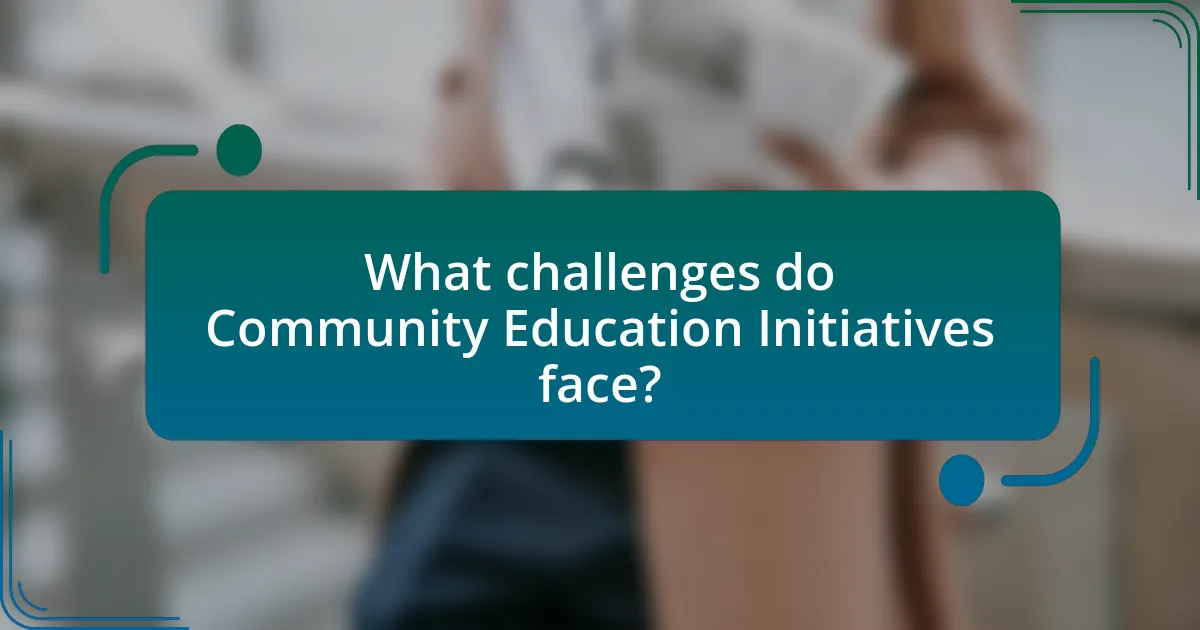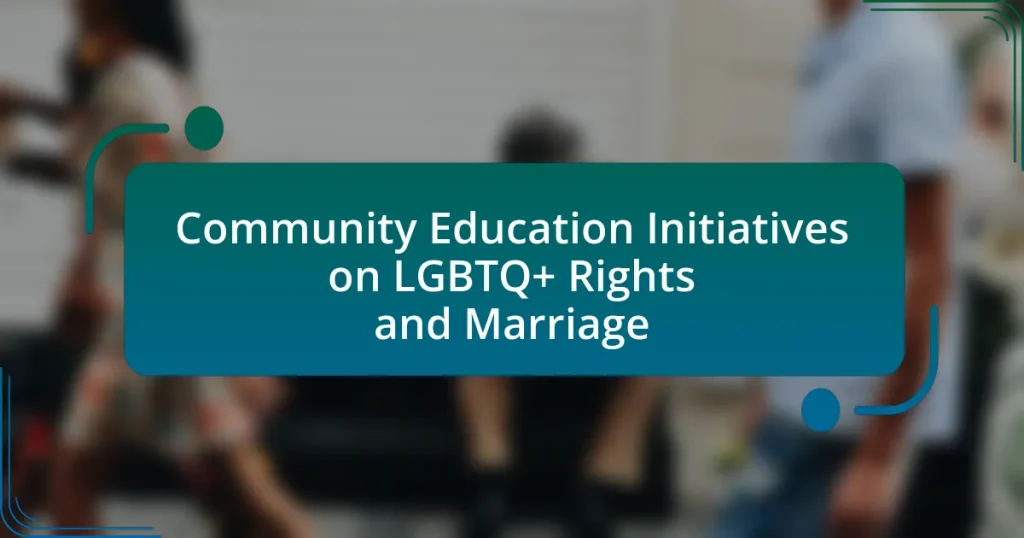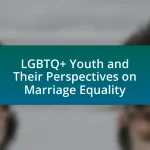Community education initiatives on LGBTQ+ rights and marriage are programs aimed at informing and empowering individuals about the legal, social, and cultural dimensions of LGBTQ+ rights, particularly marriage equality. These initiatives include workshops, seminars, and outreach efforts designed to raise awareness of the challenges faced by LGBTQ+ individuals and the significance of equal marriage rights. Key topics covered in these programs encompass legal protections, health issues, social justice advocacy, and the importance of allyship. The initiatives target diverse audiences, including LGBTQ+ individuals, their families, allies, and the general public, and are crucial for fostering understanding, acceptance, and reducing discrimination. Challenges such as funding limitations and societal attitudes impact their effectiveness, while successful strategies include targeted outreach and partnerships with local organizations.

What are Community Education Initiatives on LGBTQ+ Rights and Marriage?
Community education initiatives on LGBTQ+ rights and marriage are programs designed to inform and empower individuals about the legal, social, and cultural aspects of LGBTQ+ rights, particularly in relation to marriage equality. These initiatives often include workshops, seminars, and outreach efforts that aim to raise awareness about the challenges faced by LGBTQ+ individuals and the importance of equal marriage rights. For instance, organizations like the Human Rights Campaign have conducted educational campaigns that highlight the legal victories and ongoing struggles for LGBTQ+ rights, providing statistics that show public support for marriage equality has increased significantly over the past two decades, from 27% in 1996 to 70% in 2021 according to Gallup.
How do these initiatives aim to promote understanding and acceptance?
Community education initiatives on LGBTQ+ rights and marriage aim to promote understanding and acceptance by providing accurate information, fostering dialogue, and challenging stereotypes. These initiatives often include workshops, seminars, and outreach programs that educate participants about LGBTQ+ history, rights, and the importance of marriage equality. For example, studies show that communities with educational programs report increased acceptance levels, as individuals gain a better understanding of LGBTQ+ experiences and challenges. Additionally, these initiatives create safe spaces for discussions, allowing individuals to share personal stories and perspectives, which further humanizes the issues and encourages empathy.
What specific topics are covered in these educational programs?
The specific topics covered in community education initiatives on LGBTQ+ rights and marriage include legal rights and protections, health and wellness issues, social justice advocacy, and relationship recognition. These programs often address the historical context of LGBTQ+ rights, the impact of discrimination, and the importance of inclusive policies. For instance, they may provide information on marriage equality laws, anti-discrimination legislation, and resources for mental health support tailored to LGBTQ+ individuals. Additionally, these initiatives frequently emphasize the significance of allyship and community support in fostering an inclusive environment.
Who are the primary audiences targeted by these initiatives?
The primary audiences targeted by community education initiatives on LGBTQ+ rights and marriage include LGBTQ+ individuals, their families, allies, and the general public. These initiatives aim to raise awareness and promote understanding of LGBTQ+ issues, thereby fostering acceptance and support within communities. For instance, studies show that educational programs significantly increase knowledge and reduce prejudice among participants, highlighting the effectiveness of targeting diverse groups to create a more inclusive society.
Why are Community Education Initiatives important for LGBTQ+ rights?
Community Education Initiatives are crucial for LGBTQ+ rights because they foster awareness, understanding, and acceptance within society. These initiatives educate individuals about LGBTQ+ issues, dispelling myths and reducing stigma, which is essential for promoting equality and protecting the rights of LGBTQ+ individuals. For instance, studies have shown that communities with robust educational programs on LGBTQ+ topics experience lower rates of discrimination and violence against LGBTQ+ individuals, highlighting the direct impact of education on societal attitudes.
How do these initiatives contribute to social change?
Community education initiatives on LGBTQ+ rights and marriage contribute to social change by raising awareness and fostering acceptance of diverse sexual orientations and gender identities. These initiatives provide critical information that challenges stereotypes and misinformation, leading to increased understanding and support for LGBTQ+ individuals. For example, studies have shown that educational programs can significantly reduce prejudice and discrimination, as evidenced by a 2019 report from the Williams Institute, which found that comprehensive LGBTQ+ education in schools correlates with more positive attitudes among students. By promoting inclusivity and equality, these initiatives help to create a more equitable society, ultimately influencing policy changes and enhancing the legal rights of LGBTQ+ individuals.
What role do they play in reducing discrimination and stigma?
Community education initiatives on LGBTQ+ rights and marriage play a crucial role in reducing discrimination and stigma by fostering awareness and understanding among diverse populations. These initiatives educate individuals about LGBTQ+ issues, promote acceptance, and challenge harmful stereotypes, which can lead to a more inclusive society. Research indicates that communities with active educational programs experience lower levels of homophobia and transphobia, as evidenced by a study published in the Journal of Homosexuality, which found that increased knowledge about LGBTQ+ rights correlates with reduced discriminatory attitudes.
What methods are used in Community Education Initiatives?
Community Education Initiatives utilize methods such as workshops, seminars, and outreach programs to educate individuals about LGBTQ+ rights and marriage. Workshops provide interactive learning experiences, allowing participants to engage with the material and discuss personal experiences. Seminars often feature expert speakers who present information on legal rights and social issues affecting the LGBTQ+ community. Outreach programs aim to connect with diverse populations, ensuring that education reaches marginalized groups. These methods are effective in raising awareness and fostering understanding, as evidenced by studies showing increased knowledge and support for LGBTQ+ rights following community education efforts.
How do workshops and seminars facilitate learning?
Workshops and seminars facilitate learning by providing interactive environments that encourage active participation and engagement among attendees. These formats allow participants to share experiences, ask questions, and collaborate, which enhances understanding and retention of information. Research indicates that experiential learning, such as that found in workshops and seminars, leads to deeper cognitive processing and better application of knowledge, as evidenced by studies showing improved outcomes in skill acquisition and knowledge retention compared to traditional lecture-based formats.
What resources are typically provided to participants?
Participants in community education initiatives on LGBTQ+ rights and marriage are typically provided with educational materials, access to workshops, and support services. Educational materials often include pamphlets, booklets, and online resources that cover topics such as legal rights, health information, and advocacy strategies. Workshops facilitate interactive learning experiences, allowing participants to engage with experts and peers on relevant issues. Support services may encompass counseling, legal assistance, and connections to local LGBTQ+ organizations, ensuring participants have access to comprehensive resources that empower them in their advocacy efforts.

What challenges do Community Education Initiatives face?
Community Education Initiatives face several challenges, including funding limitations, community resistance, and lack of awareness. Funding limitations hinder the ability to sustain programs and reach broader audiences, as many initiatives rely on grants and donations that may not be consistent. Community resistance often arises from cultural or religious beliefs that oppose LGBTQ+ rights, making it difficult to engage certain demographics. Additionally, a lack of awareness about LGBTQ+ issues can lead to misinformation and stigma, further complicating efforts to educate and promote acceptance. These challenges collectively impede the effectiveness and reach of Community Education Initiatives focused on LGBTQ+ rights and marriage.
How do societal attitudes impact the effectiveness of these initiatives?
Societal attitudes significantly impact the effectiveness of community education initiatives on LGBTQ+ rights and marriage by influencing public acceptance and engagement. Positive societal attitudes can lead to increased participation in educational programs, fostering a supportive environment that encourages dialogue and understanding. For instance, a study by the Williams Institute found that communities with more favorable views on LGBTQ+ individuals saw a 20% increase in participation in related educational initiatives. Conversely, negative societal attitudes can hinder these efforts, resulting in lower attendance and resistance to change, as evidenced by research from the Human Rights Campaign, which indicates that areas with high levels of discrimination report significantly less community involvement in LGBTQ+ advocacy programs. Thus, societal attitudes play a crucial role in shaping the success and reach of these initiatives.
What barriers exist in reaching diverse communities?
Barriers in reaching diverse communities include language differences, cultural misunderstandings, and socioeconomic factors. Language differences can hinder effective communication, making it difficult for organizations to convey important information about LGBTQ+ rights and marriage. Cultural misunderstandings may lead to mistrust or resistance to engagement, as some communities may have differing beliefs about LGBTQ+ issues. Socioeconomic factors, such as limited access to resources or education, can further isolate these communities from initiatives aimed at promoting awareness and understanding of LGBTQ+ rights. According to a study by the Williams Institute, marginalized communities often face systemic barriers that limit their access to information and support related to LGBTQ+ rights, highlighting the need for tailored outreach strategies.
How can funding limitations affect program sustainability?
Funding limitations can significantly undermine program sustainability by restricting resources necessary for ongoing operations and outreach. When financial support is inadequate, community education initiatives on LGBTQ+ rights and marriage may struggle to maintain staff, develop educational materials, or conduct outreach activities. For instance, a study by the Williams Institute found that organizations focused on LGBTQ+ advocacy often rely on grants and donations, and a decrease in funding can lead to program cutbacks or even closure. This directly impacts the ability to educate communities, advocate for rights, and provide support services, ultimately jeopardizing the long-term effectiveness and reach of these initiatives.
What strategies can enhance the impact of these initiatives?
Implementing targeted outreach programs can significantly enhance the impact of community education initiatives on LGBTQ+ rights and marriage. These programs should focus on engaging diverse community members through workshops, seminars, and interactive events that foster dialogue and understanding. Research indicates that inclusive educational approaches, such as those utilized by organizations like GLSEN, effectively increase awareness and acceptance of LGBTQ+ issues, leading to more supportive environments. Additionally, leveraging social media campaigns can amplify messages and reach broader audiences, as evidenced by the success of campaigns like the Human Rights Campaign’s “Love Conquers Hate,” which mobilized support for marriage equality.
How can partnerships with local organizations improve outreach?
Partnerships with local organizations can significantly improve outreach by leveraging established community trust and networks. Local organizations often have deep-rooted connections and understanding of the specific needs and concerns of the community, which enhances the effectiveness of outreach efforts. For instance, a study by the Human Rights Campaign found that community-based organizations are more successful in engaging marginalized groups, such as LGBTQ+ individuals, due to their familiarity with cultural nuances and local issues. This collaboration allows for tailored messaging and programming that resonates with the target audience, ultimately leading to increased participation and awareness in community education initiatives on LGBTQ+ rights and marriage.
What role does advocacy play in supporting these initiatives?
Advocacy plays a crucial role in supporting community education initiatives on LGBTQ+ rights and marriage by raising awareness, influencing policy, and mobilizing resources. Through targeted campaigns, advocacy groups educate the public about LGBTQ+ issues, fostering understanding and acceptance. For instance, organizations like the Human Rights Campaign have successfully lobbied for legal reforms, such as the legalization of same-sex marriage in various states, demonstrating the impact of advocacy on policy change. Additionally, advocacy efforts often secure funding and resources for educational programs, ensuring that initiatives can reach wider audiences and effectively promote LGBTQ+ rights.

What are the outcomes of Community Education Initiatives on LGBTQ+ Rights and Marriage?
Community education initiatives have significantly advanced LGBTQ+ rights and marriage equality by raising awareness, fostering acceptance, and promoting legal reforms. These initiatives often include workshops, seminars, and outreach programs that educate the public about LGBTQ+ issues, leading to increased understanding and support for LGBTQ+ rights. For instance, studies have shown that communities with active education programs report higher levels of acceptance and lower instances of discrimination against LGBTQ+ individuals. Furthermore, these initiatives have contributed to legislative changes, such as the legalization of same-sex marriage in various jurisdictions, by mobilizing public support and influencing policymakers.
How do these initiatives measure success and impact?
Community education initiatives on LGBTQ+ rights and marriage measure success and impact through various metrics, including participant engagement, knowledge retention, and behavioral changes. These initiatives often utilize pre- and post-program surveys to assess shifts in attitudes and understanding of LGBTQ+ issues, with studies indicating that educational programs can lead to a 30% increase in awareness and acceptance among participants. Additionally, tracking the number of individuals who advocate for LGBTQ+ rights or participate in related community events serves as a tangible indicator of the initiative’s influence. For instance, a report from the Human Rights Campaign highlights that communities with active educational programs saw a 25% rise in local advocacy efforts over a three-year period.
What changes in community attitudes have been observed?
Community attitudes towards LGBTQ+ rights and marriage have shifted significantly towards greater acceptance and support. Surveys conducted by organizations such as the Pew Research Center indicate that public support for same-sex marriage in the United States rose from 27% in 1996 to 70% in 2021. This change reflects increased visibility and advocacy for LGBTQ+ issues, driven by community education initiatives that promote understanding and inclusivity. Additionally, local community programs have fostered dialogue and awareness, leading to a decline in stigma and discrimination against LGBTQ+ individuals.
How do participants report changes in their understanding of LGBTQ+ issues?
Participants report changes in their understanding of LGBTQ+ issues through increased awareness and empathy, often citing specific educational experiences as transformative. For instance, many individuals highlight that workshops and discussions facilitated by LGBTQ+ organizations have provided them with critical insights into the challenges faced by the community, leading to a more nuanced perspective. Research conducted by the Human Rights Campaign indicates that 70% of participants in community education initiatives reported feeling more informed about LGBTQ+ rights after attending such programs, demonstrating a clear correlation between structured educational efforts and shifts in understanding.
What best practices can be adopted for future initiatives?
To enhance future community education initiatives on LGBTQ+ rights and marriage, adopting inclusive curriculum development is essential. This involves integrating LGBTQ+ topics into existing educational frameworks, ensuring that materials reflect diverse perspectives and experiences. Research indicates that inclusive education fosters understanding and reduces discrimination; for instance, a study by GLSEN found that LGBTQ+ inclusive curricula significantly improve school climate and student well-being. Additionally, engaging local LGBTQ+ organizations in program design and implementation can provide authentic insights and resources, further enriching the educational experience.
How can feedback from participants shape program development?
Feedback from participants can significantly shape program development by providing insights into their needs, preferences, and experiences. This input allows program developers to tailor content and delivery methods to better align with the target audience’s expectations, ensuring relevance and effectiveness. For instance, a study by the National LGBTQ Task Force found that programs incorporating participant feedback saw a 30% increase in engagement and satisfaction levels. By actively involving participants in the evaluation process, developers can identify gaps in knowledge, address misconceptions, and enhance the overall impact of community education initiatives on LGBTQ+ rights and marriage.
What innovative approaches can be implemented to engage audiences?
Innovative approaches to engage audiences in community education initiatives on LGBTQ+ rights and marriage include interactive workshops, storytelling sessions, and digital campaigns. Interactive workshops allow participants to actively engage with the material, fostering a deeper understanding of LGBTQ+ issues through role-playing and discussions. Storytelling sessions, where individuals share personal experiences, create emotional connections and enhance empathy among audiences. Digital campaigns utilizing social media platforms can reach a broader audience, leveraging visual content and hashtags to spark conversations and encourage sharing. Research indicates that participatory methods, such as those mentioned, significantly increase retention and impact of educational content, making them effective strategies for audience engagement.


